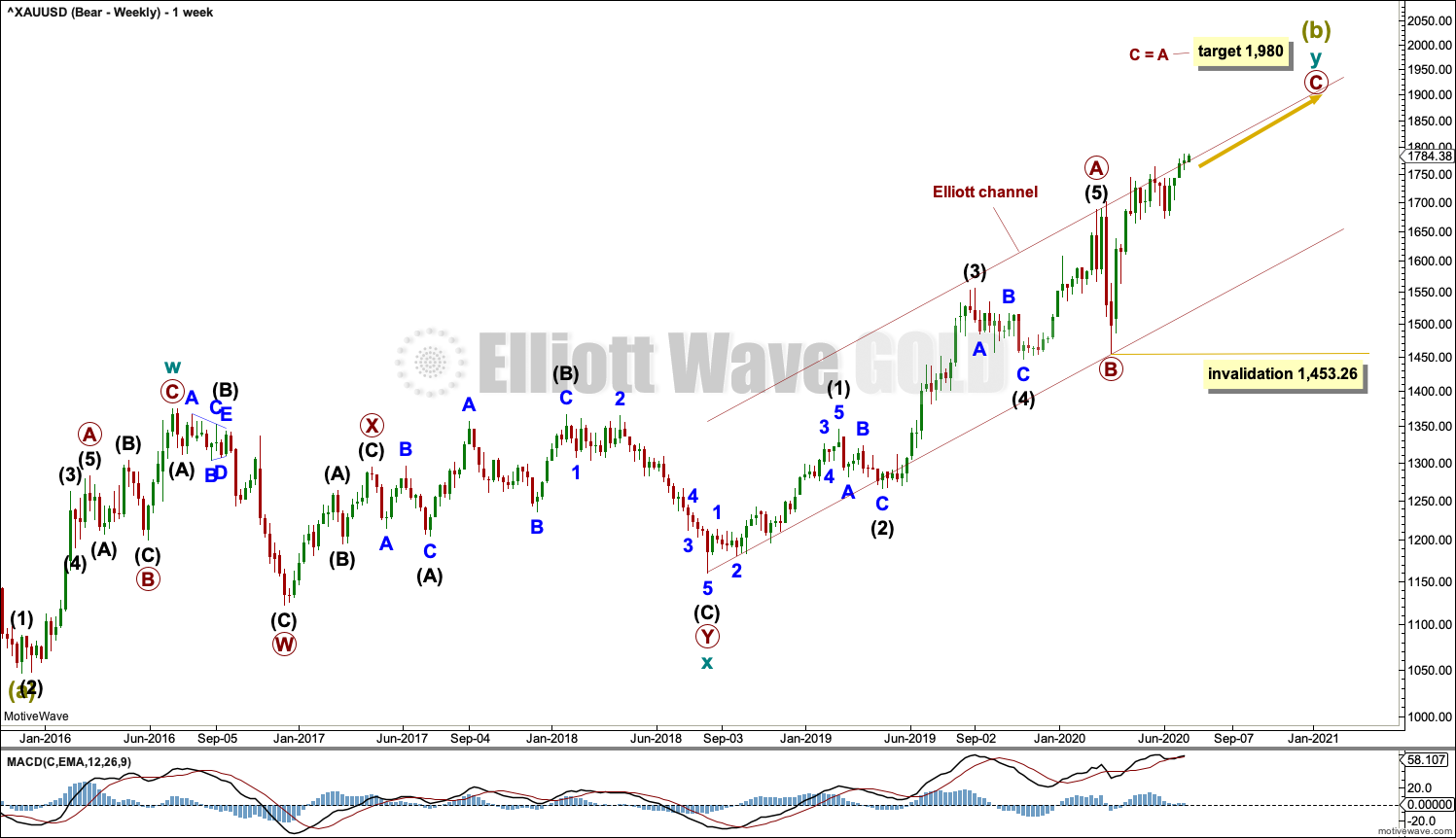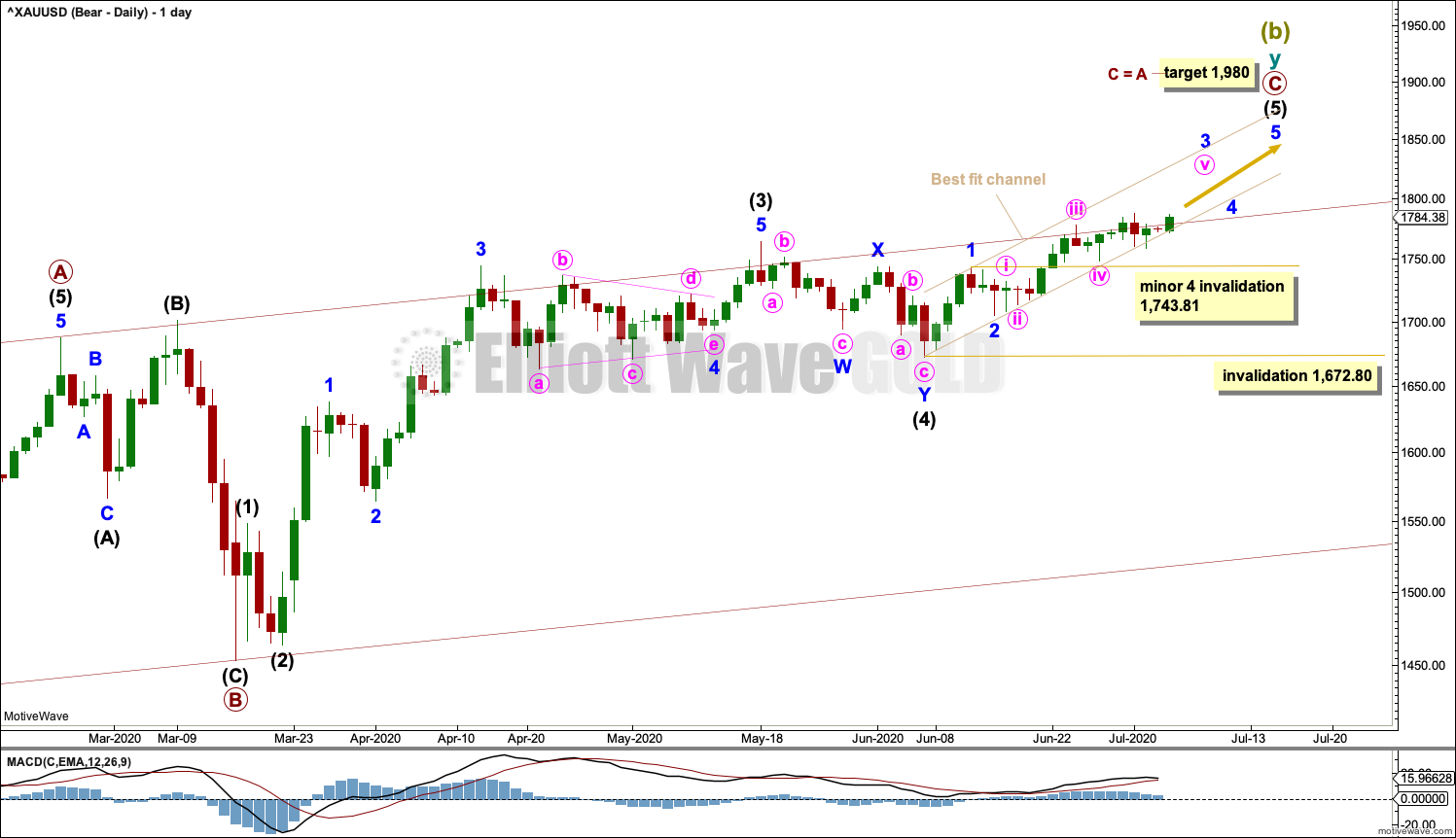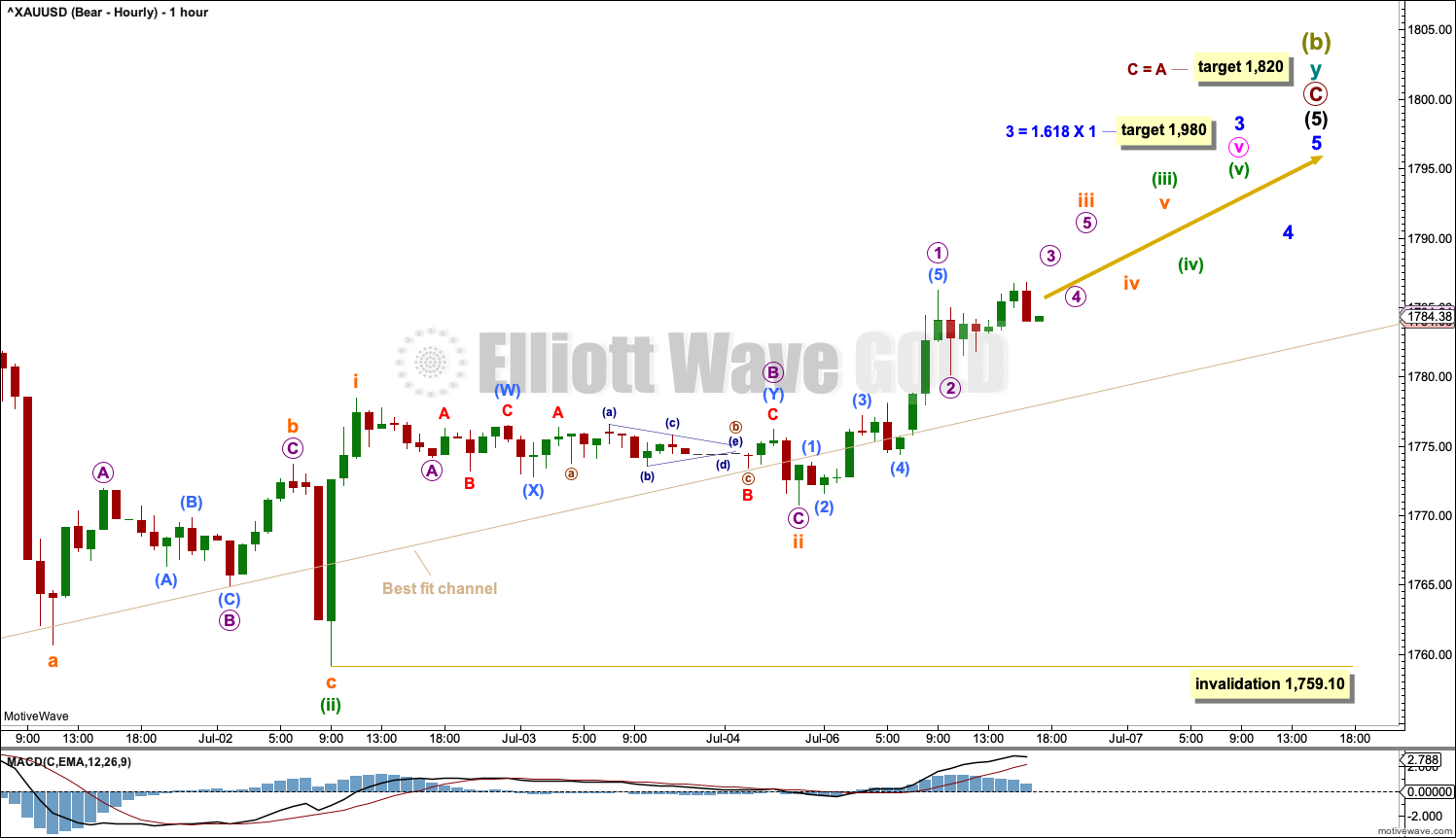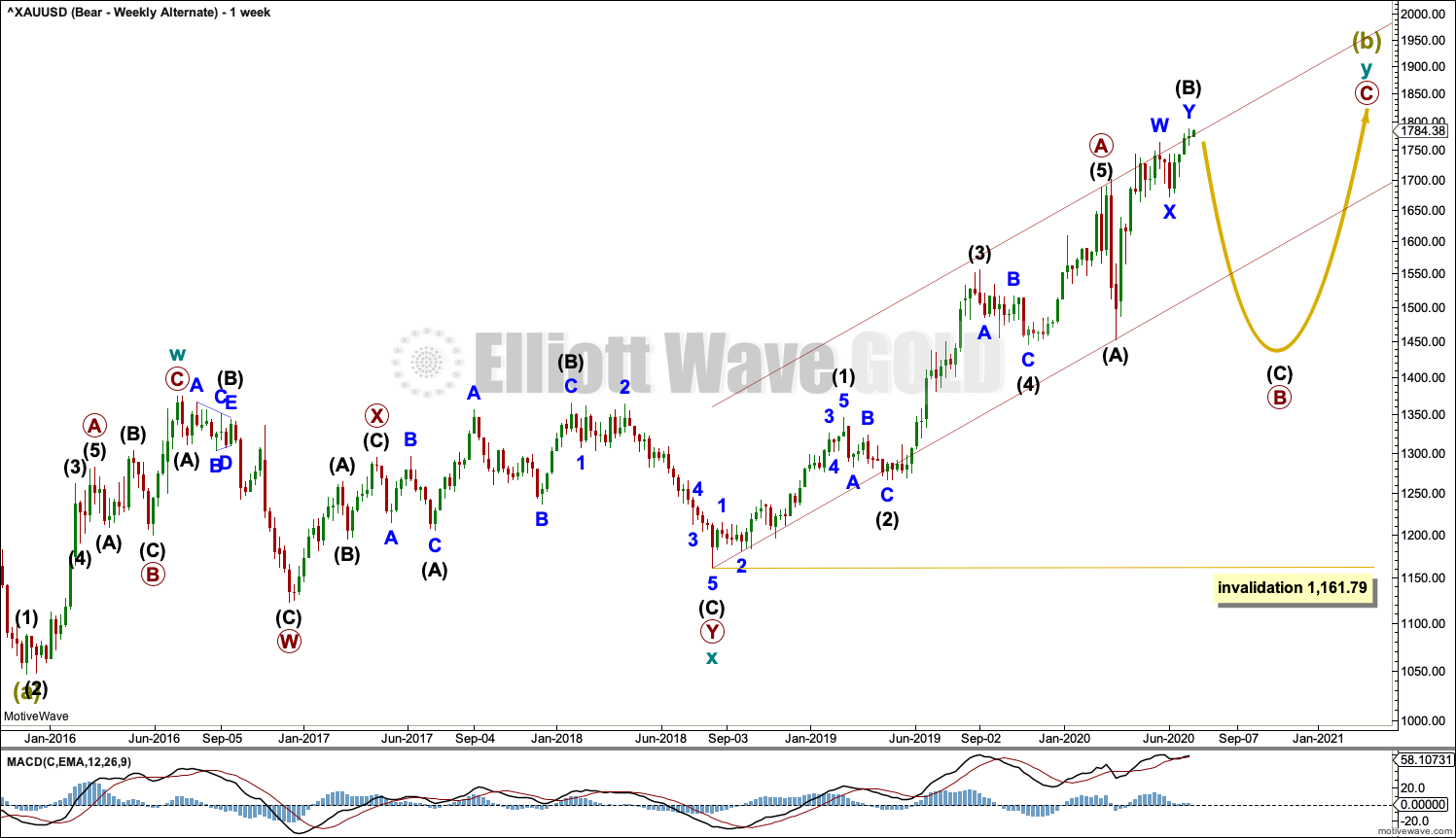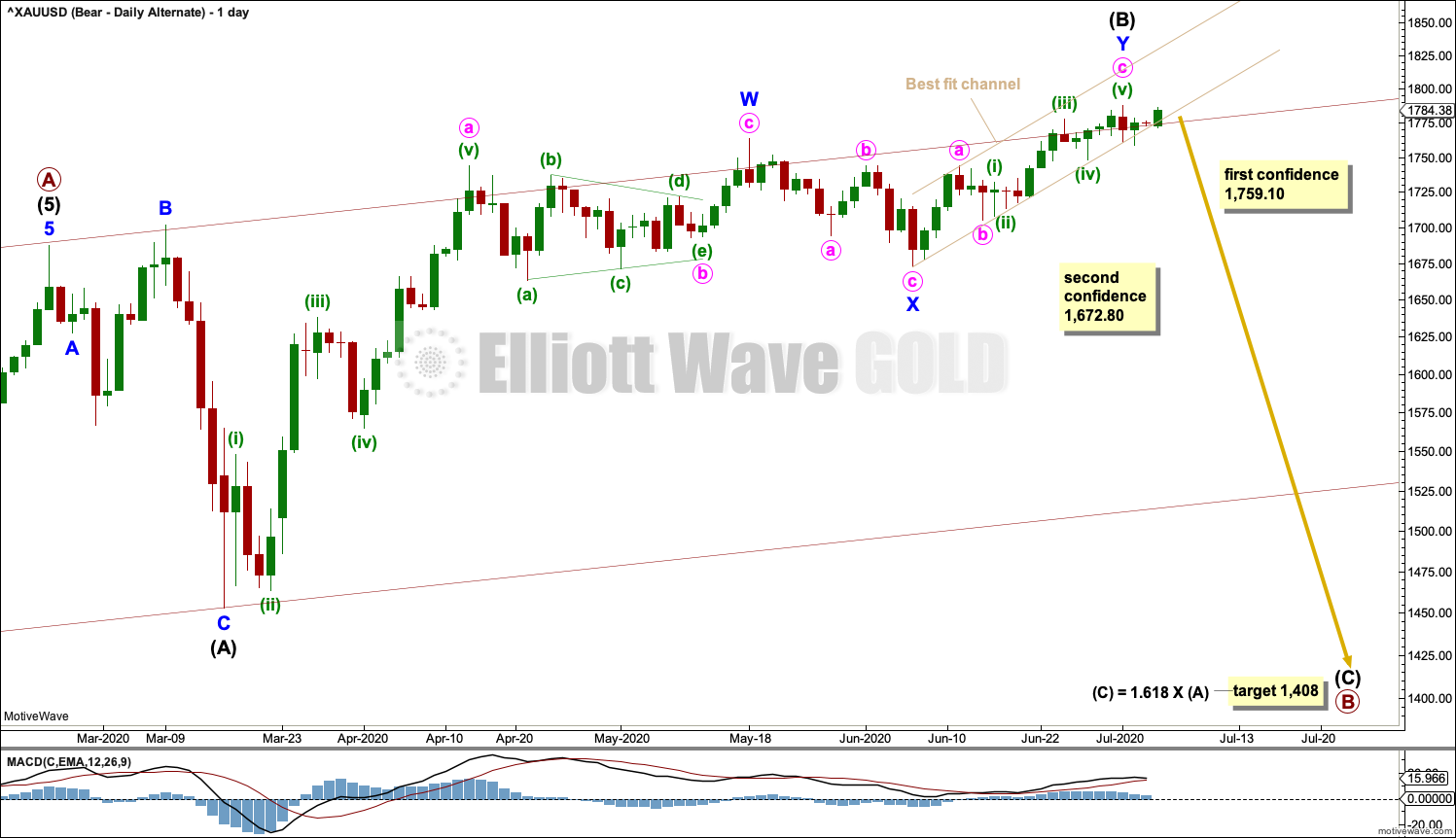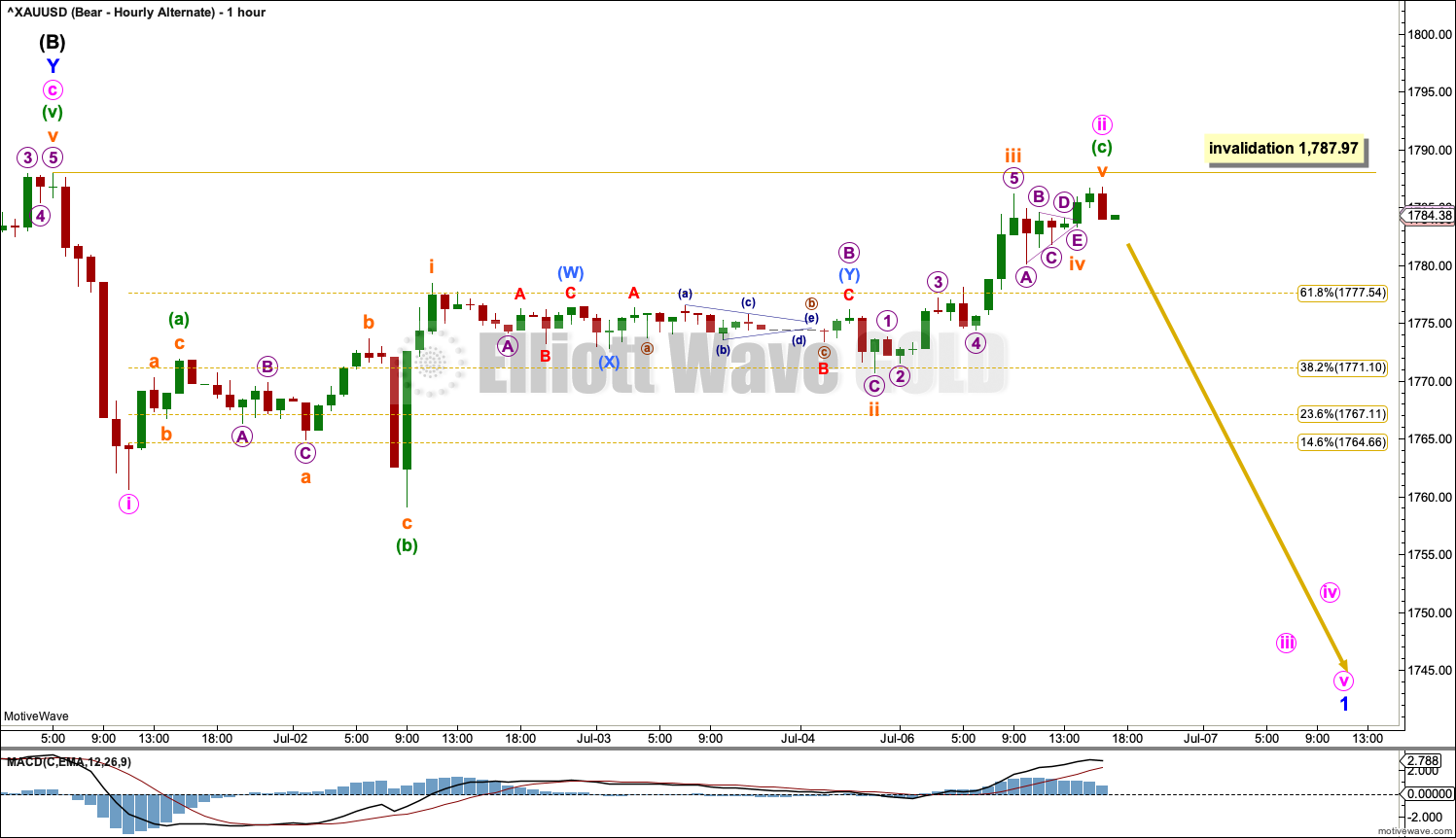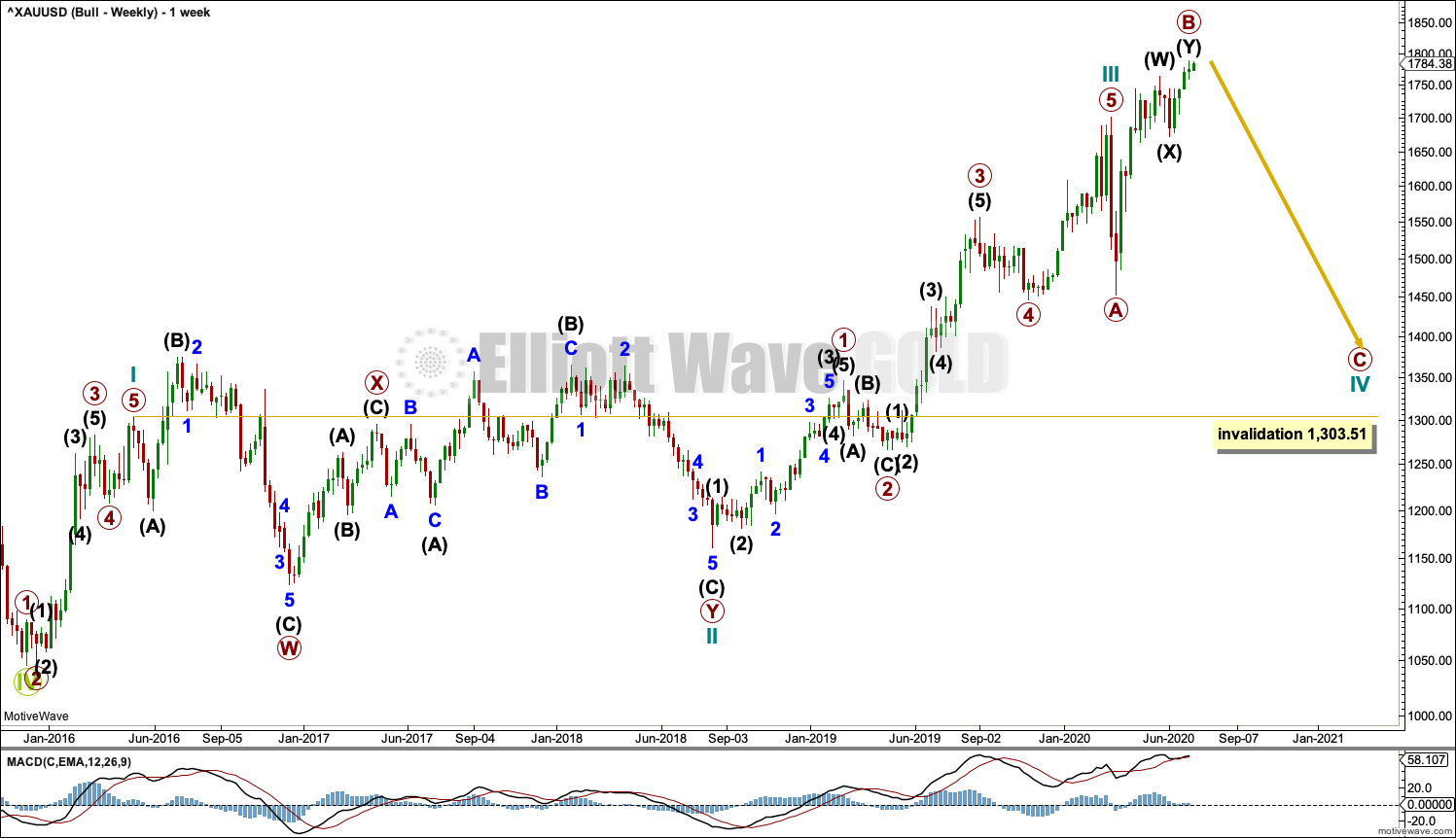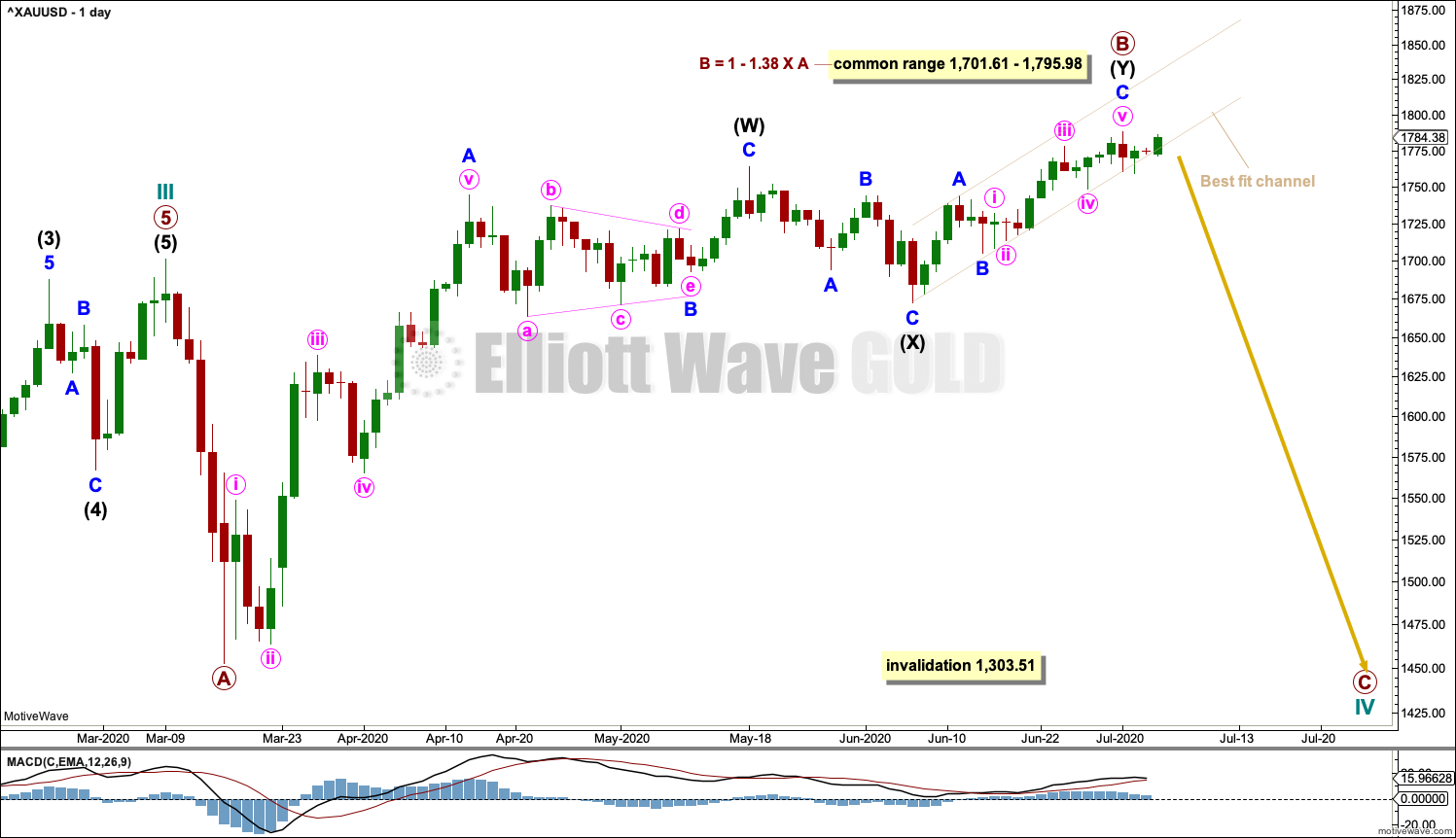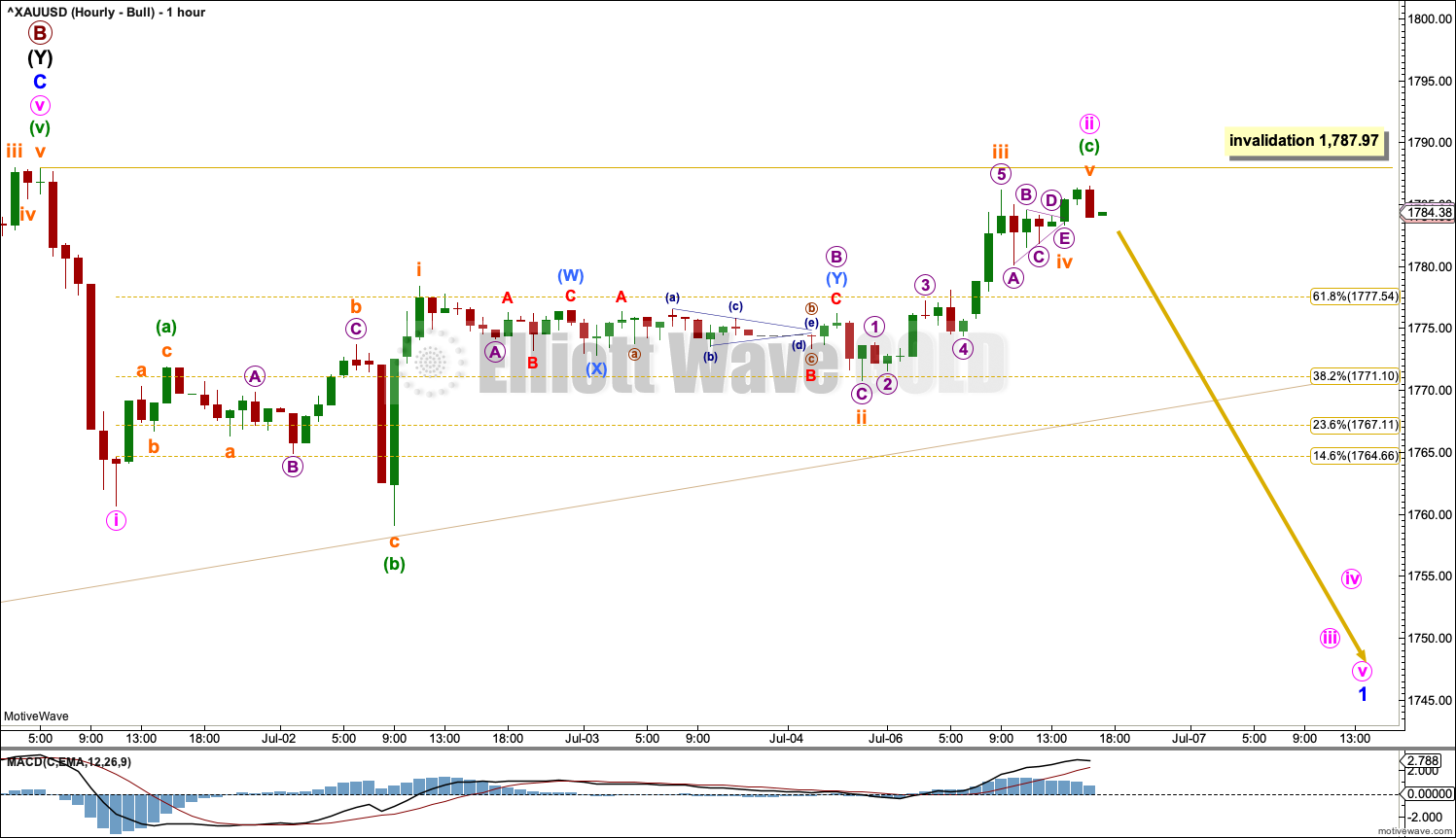GOLD: Elliott Wave and Technical Analysis | Charts – July 6, 2020
A weak upwards day does not support the main wave count today.
Summary: While price remains above 1,759.10, assume the upwards trend remains intact and use the main Elliott wave count. The next target is at 1,980.
A new low below 1,759.10 would shift probability towards the alternate bearish Elliott wave count. A new low below 1,672.80 would increase probability in that wave count substantially. At that stage, the target would be at 1,408.
Price remains within the consolidation zone. The short-term volume profile and On Balance Volume remain bearish.
Grand SuperCycle analysis is here.
Monthly charts were last updated here.
MAIN BEARISH ELLIOTT WAVE COUNT
WEEKLY CHART
The bigger picture for this main bearish Elliott wave count sees Gold as still within a bear market, in a three steps back pattern that is labelled Grand Super Cycle wave IV on monthly charts.
Super Cycle wave (b) within Grand Super Cycle wave IV may be an incomplete double zigzag. When Super Cycle wave (b) may be complete, then this wave count expects Super Cycle wave (c) to begin and to move price below the end of Super Cycle wave (a) at 1,046.27.
The first zigzag in the double is labelled cycle wave w. The double is joined by a three in the opposite direction, a combination labelled cycle wave x. The second zigzag in the double is labelled cycle wave y.
The purpose of the second zigzag in a double is to deepen the correction. Cycle wave y has achieved this purpose.
We should always assume the trend remains the same until proven otherwise. At this stage, Gold is in a bull market for the mid term.
DAILY CHART
Primary wave C may be an incomplete five wave impulse.
Within the impulse: intermediate waves (1) through to (3) may be complete and intermediate wave (4) may be a double zigzag. No second wave correction within intermediate wave (5) may move beyond its start below 1,672.80.
Minor waves 1 and 2 within intermediate wave (5) may now be complete. Minor wave 3 is incomplete. When minor wave 4 arrives, then it may not move into minor wave 1 price territory below 1,743.81.
Draw a best fit channel about the start of intermediate wave (5) as shown. The lower edge of the channel may provide support for corrections along the way up.
This wave count expects that a third wave is continuing to unfold higher. Third waves should exhibit strength and should have support from volume. With the data in hand at this time, this third wave looks weak. This gives concern for this wave count.
HOURLY CHART
The hourly chart shows the end of minor wave 3, from the low of minute wave iv within minor wave 3. Minor wave 3 may only subdivide as an impulse.
Minute waves i through to iv within the impulse of minor wave 3 may now be complete. Minute wave v may be underway. Minuette waves (i) and (ii) within minute wave v may be complete. Minuette wave (ii) may have ended with an overshoot of the lower edge of the best fit channel.
Gold typically exhibits swift strong fifth waves to end third waves one degree higher. Look out for the possibility that minuette wave v to end minute wave v to end minor wave 3 may exhibit a blow off top.
No second wave correction within minuette wave (iii) may move beyond its start below 1,759.10.
ALTERNATE BEARISH ELLIOTT WAVE COUNT
WEEKLY CHART
This wave count has support from classic technical analysis.
It is possible that primary wave B is an incomplete expanded flat correction.
The only problem with this wave count is the size in terms of both duration and price travelled for primary wave B. It looks much larger than cycle wave w, but cycle wave y is already much longer than cycle wave w, so this may be acceptable.
If primary wave A is correctly labelled as a five wave structure, then primary wave B may not move beyond its start below 1,161.79.
DAILY CHART
Primary wave B may be continuing as an expanded flat correction. The most common range for intermediate wave (B) within an expanded flat is from 1 to 1.38 times the length of intermediate wave (A), giving a range from 1,687.92 to 1,777.09. If intermediate wave (B) has ended at the last high, then it would be a little longer than this range; intermediate wave (B) would be 1.43 times the length of intermediate wave (A). This very slightly reduces the probability of this wave count.
Intermediate wave (B) may now be a complete structure. A trend change would now be expected. Intermediate wave (C) downwards would be extremely likely to make at least a slight new low below the end of intermediate wave (A) at 1,453.26 to avoid a truncation and a very rare running flat.
A target is now calculated for intermediate wave (C) to end.
This alternate wave count sees an expanded flat unfolding for primary wave B, in mostly the same way as the alternate bullish wave count below sees an expanded flat unfolding for cycle wave IV.
HOURLY CHART
This hourly chart shows the end of minute wave c within minor wave Y within intermediate wave (B).
The low labelled minuette wave (iv) may be seen on the daily chart.
Minute wave c may be a complete impulse.
Minute wave ii within a new downwards trend may not move beyond the start of minute wave i above 1,787.97.
ALTERNATE BULLISH ELLIOTT WAVE COUNT
WEEKLY CHART
This wave count sees the the bear market complete at the last major low for Gold on 3 December 2015.
If Gold is in a new bull market, then it should begin with a five wave structure upwards on the weekly chart.
Cycle wave I fits as a five wave impulse with reasonably proportionate corrections for primary waves 2 and 4.
Cycle wave II fits as a double flat. However, within the first flat correction labelled primary wave W, this wave count needs to ignore what looks like an obvious triangle from July to September 2016 (this can be seen labelled as a triangle on the bear wave count above). This movement must be labelled as a series of overlapping first and second waves. Ignoring this triangle reduces the probability of this wave count in Elliott wave terms.
Within the first flat correction labelled primary wave W of the double flat of cycle wave II, intermediate wave (B) is 1.69 the length of intermediate wave (A). This is longer than the common range of up to 1.38, but within an allowable guideline of up to 2. The length of intermediate wave (B) reduces the probability of this wave count.
Cycle wave III may be complete. Cycle wave IV may not move into cycle wave I price territory below 1,303.51.
DAILY CHART
Cycle wave IV may be an incomplete expanded flat correction. Primary wave A within the flat correction may have subdivided as a zigzag. Primary wave B may be continuing higher as a double zigzag.
The common range of primary wave B would extend up to 1.38 times the length of primary wave A at 1,795.98. A maximum allowable guideline for primary wave B would be up to 2 times the length of primary wave A at 1,949.96. There is no Elliott wave rule stating a limit for B waves within expanded flat corrections, so there is no rule which may be used to determine an upper invalidation point for this wave count.
If primary wave B is complete at the last high, then it would be 1.35 times the length of primary wave A, which is within the most common range.
Draw a best fit channel about intermediate wave (Y). Copy the channel over to the hourly chart. Assume upwards movement may continue while price remains within the channel. If the channel is breached, then assume intermediate wave (Y) may be over.
HOURLY CHART
Primary wave B may be complete.
Minute wave ii within a new downwards trend may not move beyond the start of minute wave i above 1,787.97.
TECHNICAL ANALYSIS
WEEKLY CHART
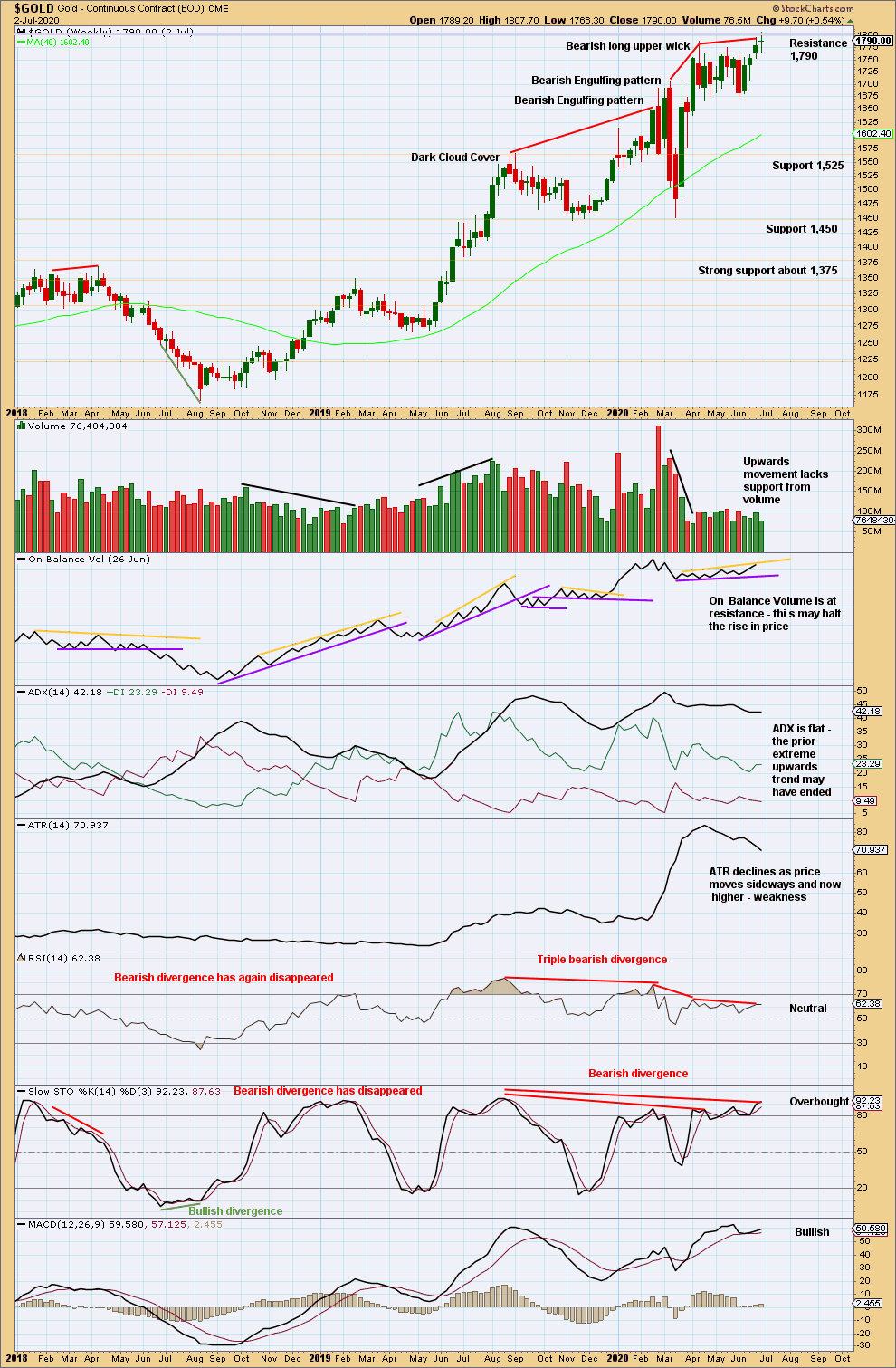
Click chart to enlarge. Chart courtesy of StockCharts.com.
Price remains within a consolidation with support about 1,665 to 1,680.
There is now strong triple bearish divergence between price and RSI. This supports either the alternate bearish Elliott wave count or the bullish Elliott wave count.
DAILY CHART
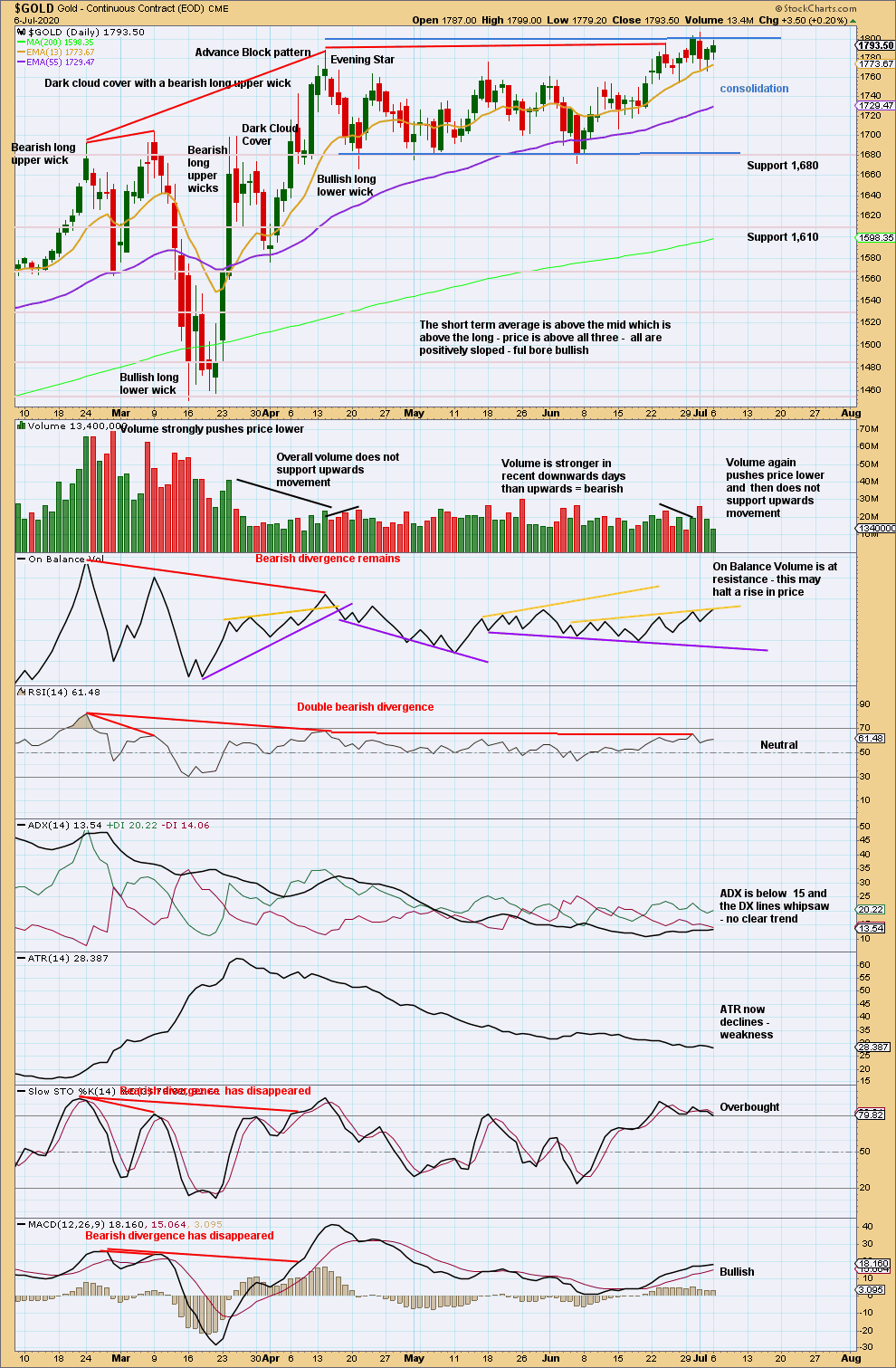
Click chart to enlarge. Chart courtesy of StockCharts.com.
The consolidation zone spans from resistance about 1,800 to support about 1,680.
Volume and On Balance Volume still suggest a downwards breakout may be more likely than upwards.
Within the consolidation, Stochastics at overbought suggests the upwards swing may end here or very soon and a downwards swing may begin.
GDX WEEKLY CHART
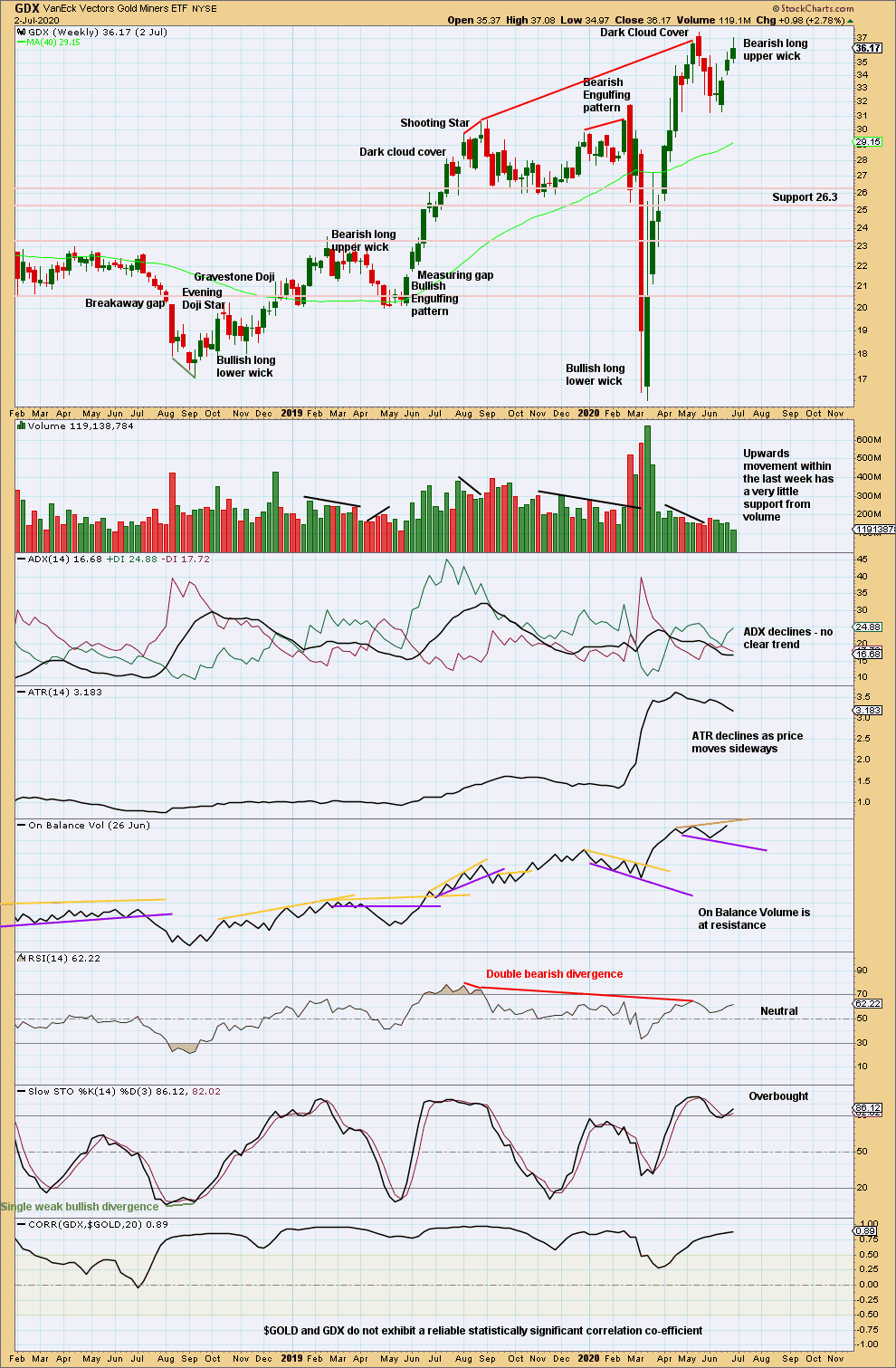
Click chart to enlarge. Chart courtesy of StockCharts.com.
Overall, range and volume are declining as price moves higher. Price is range bound.
GDX DAILY CHART
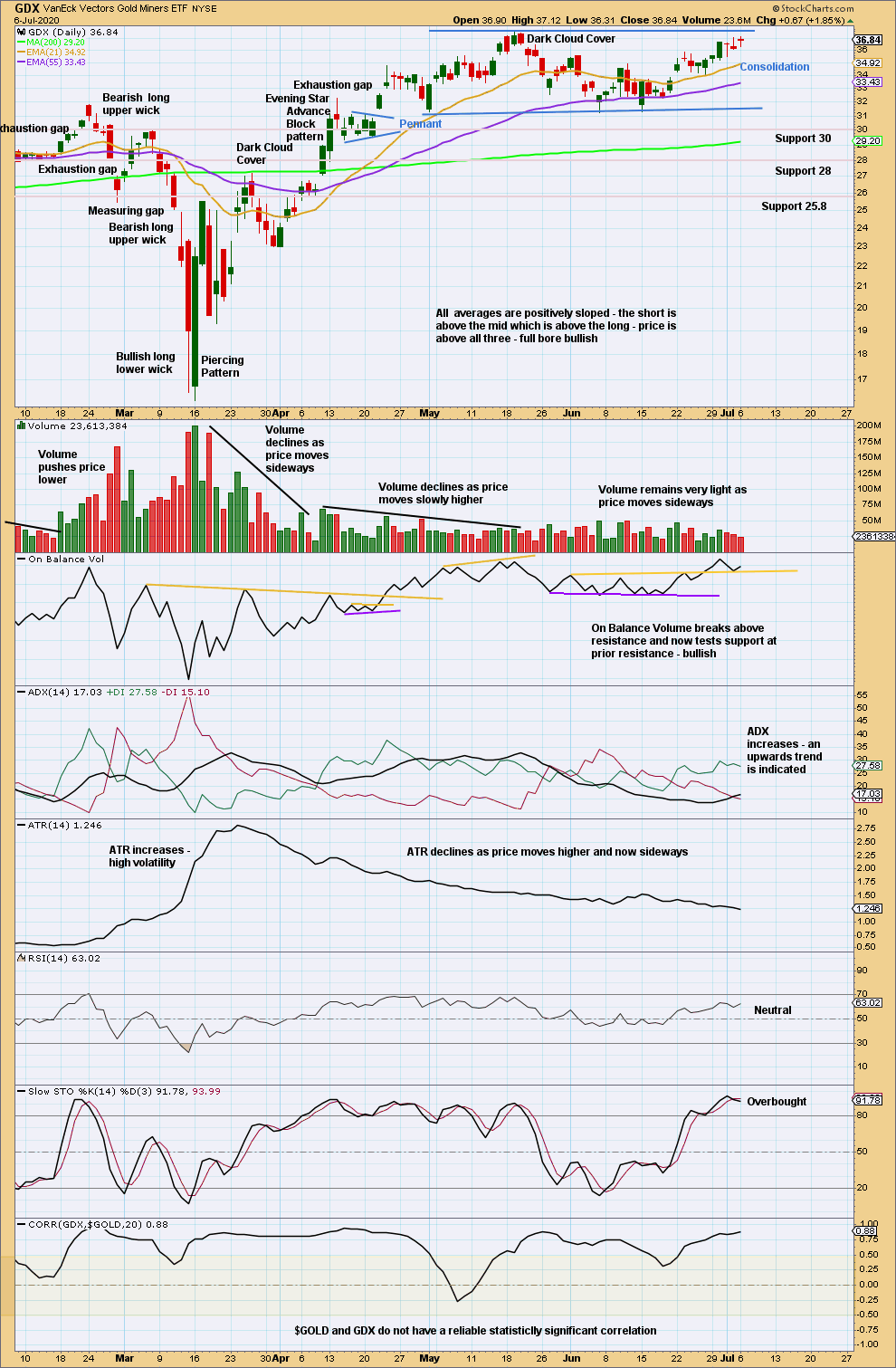
Click chart to enlarge. Chart courtesy of StockCharts.com.
Price is range bound with resistance about 35.55 to 37.50 and support about 31.20 to 31.30. A breakout of this range is required before having confidence in a trend. An upwards breakout should have support from volume for confidence. A downwards breakout does not require volume for support.
Published @ 07:11 p.m. ET.
—
Careful risk management protects your trading account(s).
Follow my two Golden Rules:
1. Always trade with stops.
2. Risk only 1-5% of equity on any one trade.
—
New updates to this analysis are in bold.

